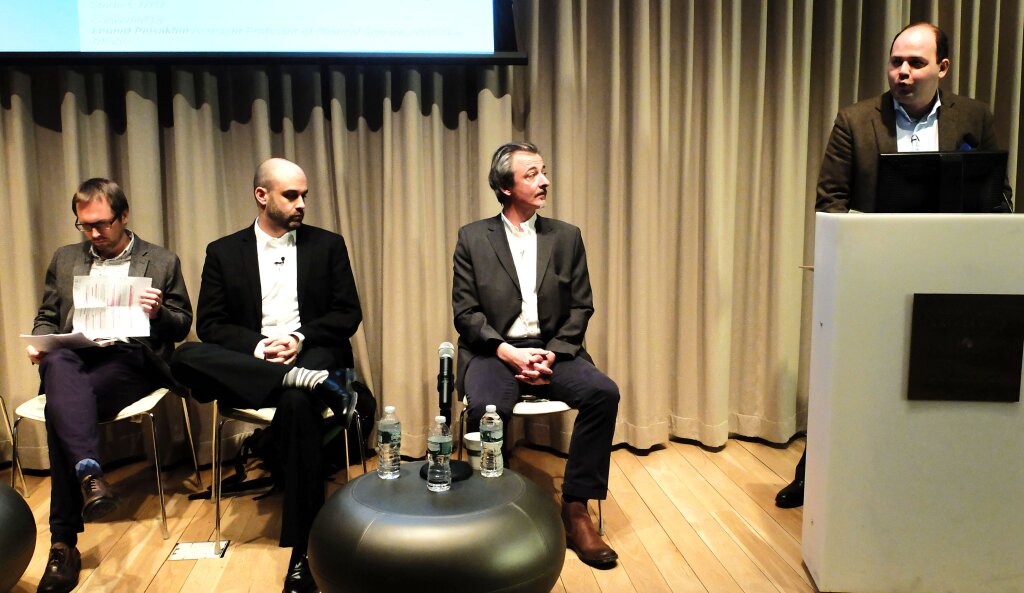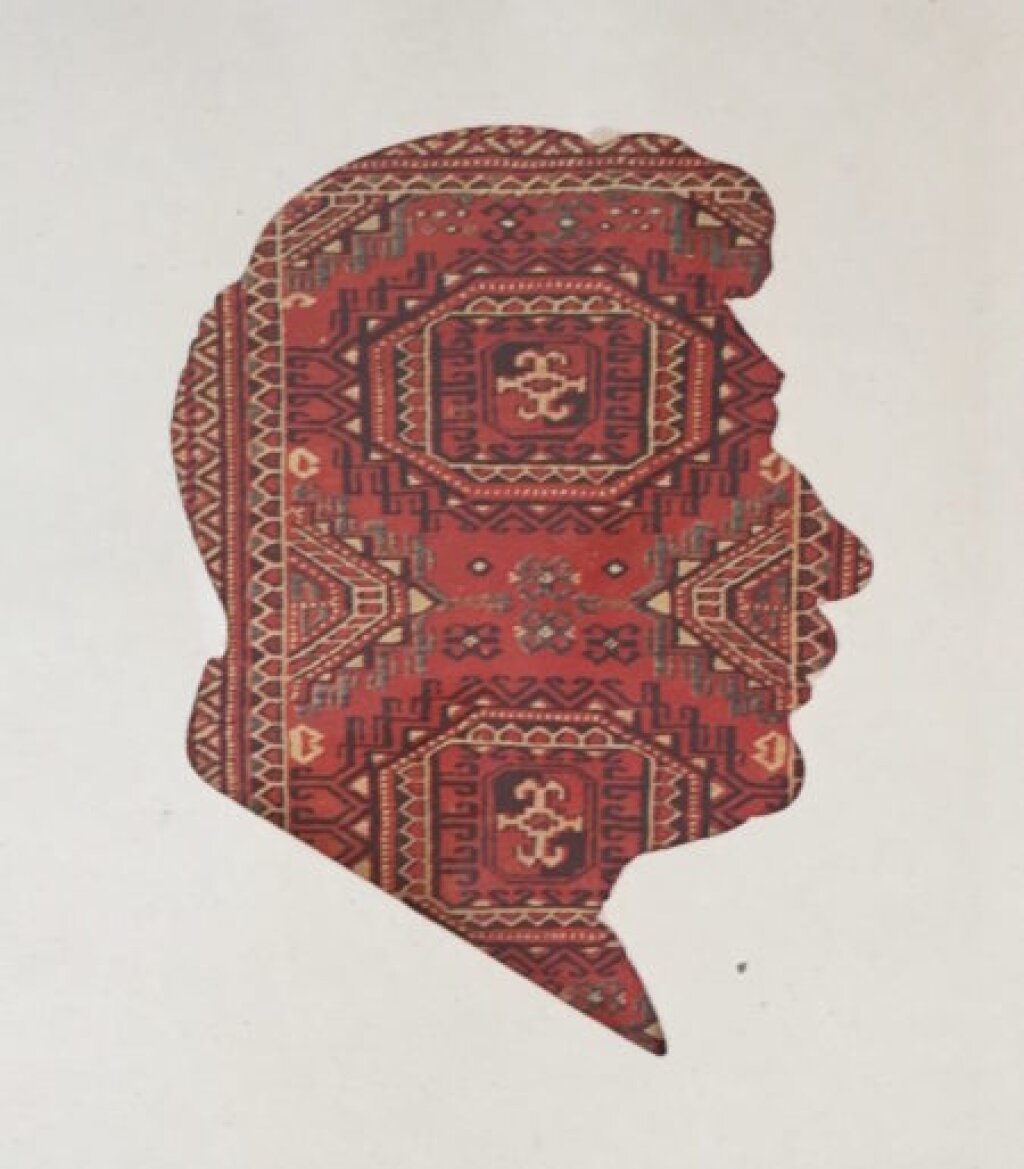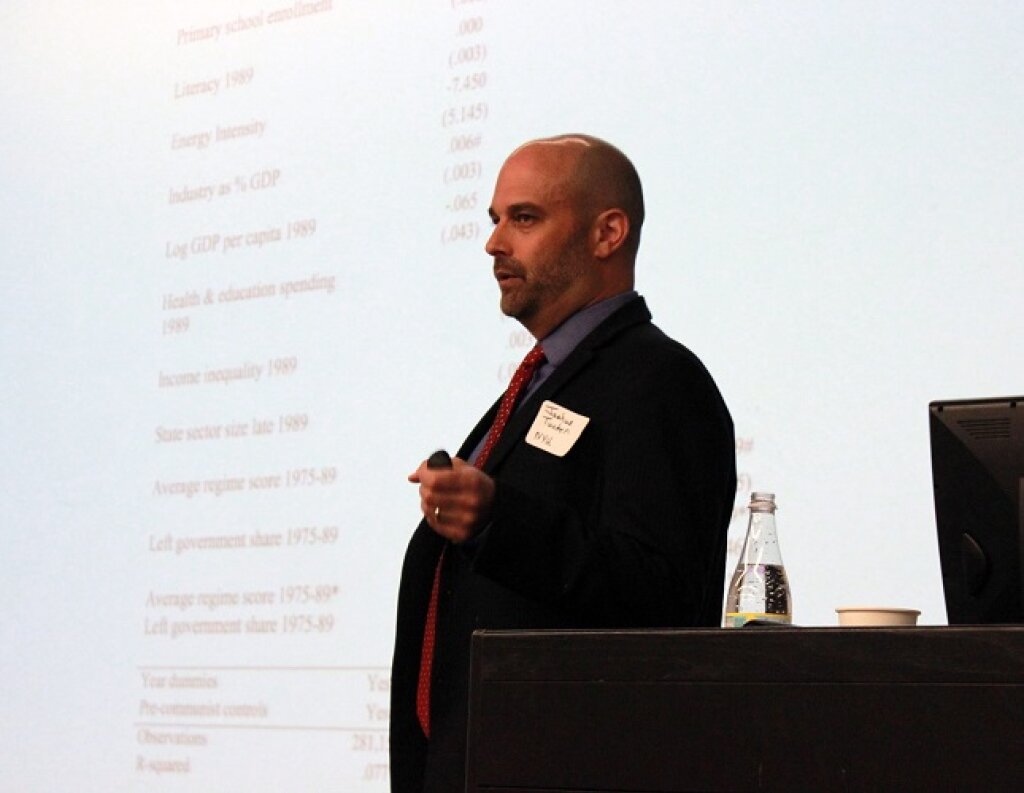On February 25, 2015, a large crowd convened at NYU’s Abu Dhabi Institute for a panel on the current relations between Ukraine, Russia and the West. The panel, titled “Russia-Ukraine Relations: A Neighborly Spat or Back to the Cold War?,” was held in collaboration with the Jordan Center for the Advanced Study of Russia and was convened by Leonid Peisakhin, Assistant Professor of Politics at NYU Abu Dhabi. Peisakhin was joined in discussion by Yanni Kotsonis (Director of Jordan Center and Professor of History at NYU), Joshua Tucker (Professor of Politics at NYU) and Arturas Rozenas (Assistant Professor of Politics at NYU).
Russia's game: Replacing foreign policy with economy
Kotsonis began his talk by stating that “living in the middle of an empire [the United States] makes it difficult to put oneself into someone else’s shoes and to see how the world feels to them.” But, he continued, it is important to understand what the world looks like from the Russian point of view. He then described Russia’s position with regard to Ukraine in light of political and economic constraints faced in establishing a relationship with the West since the collapse of the Soviet Union.
In 1991, according to Kotsonis, Russia itself decided that it would be “much better off without the Union.” Freed from the burden of the empire, it wanted to transform itself into a geopolitical power, which would play by the rules of the modern capitalist economy. And that it did: Russia quickly gained its economic might by trading its abundant natural resources. Yet, at every turn, Russia was always confronted with a push back by NATO and the US. For instance, Russia felt that its territories of influence were being slowly peeled off (i.e. the Baltic states becoming part of NATO or the US/Russia conflict in Georgia). It also did not want to give up its rightful economic power to foreign investors. As a result, as Russia tried to cooperate and negotiate with Western powers, it was “dismissed almost contemptuously” or met with silence.
What were Russia’s tactics in response to feeling ousted from the game of the mighty? Beginning in the 1990s, Russia had the idea that its economy would take the role of its foreign policy. But there are only so many times that you can cut off the gas in order to exercise power in foreign disputes, Kotsonis stated. Eventually, the countries you are trying to confront will look for the needed resources elsewhere. In the end, Russia simply does not have the economic capacity to be on the same level with the Western powers, he concluded [compare for instance, Russia’s GDP of 2 trillion dollars to the EU and the US, each around 16- 17 trillion dollars].
In light of this economic weakness, Ukraine becomes the space where Russia might show its military might. The first thing that Putin said after the annexation of Crimea was: “and now the world has to listen to Russia.” Russia might not have a good army, but it is still something to fear if you are one of Russia’s neighbors. It also has nuclear weapons. In his view, it is reckless of the US to behave too brazenly as it rolls back Russian power in the region. The US, as the remaining empire in the world, should act more responsibly in this crisis.
Why did Putin annex Crimea?
Subsequently, Tucker took center stage, explaining how he once stated that Putin would not annex Crimea. His prediction was partly based on his comparison of the Ukrainian situation to the Russo-Georgian conflict in 2008. For instance, the military might of Ukraine is far greater than that of Georgia. Tucker also felt that in the case of annexation, Russia would isolate itself internationally.
“How did I get it so spectacularly wrong?” he asked. Was Putin motivated by international security concerns or by domestic issues? Was he acting out of strength or weakness? He offered several scenarios that could potentially explain Russia’s puzzling involvement in Ukraine.
The first scenario sees Putin’s actions as driven by fear and security concerns. Perhaps, it was a fear of waking up in a world where NATO is encroaching closer and closer: Russia might have started feeling that it needed to do something drastic and painful in order to protect its people. This is a popular story on the American left, Tucker pointed out. In this case, Western countries need to treat Russia with more respect in order to calm the crisis.
Another scenario is popular among members of the American right. This is still a story of security concerns, but, one that sees Putin acting out of strength, possibly wanting to resurrect the USSR. In this scenario, Tucker continued, someone needs to rise to the rescue and show Russia that there will be real costs.
In an alternative interpretation, Putin might be acting out of fears concerning Russia’s domestic situation. To Putin, the increasing protests in the country since the 2011 elections, might have felt as a betrayal by the very middle class that he enabled to prosper. In this case, he now needed a new coalition composed of conservatives and nationalists. Through his involvement in Ukraine, Putin can simultaneously boost nationalist sentiments and show to the Russian people that no good can come from Euromaidan.
In his conclusion, Tucker questioned how much the current economic downturn experienced by Russia will be tolerated and not revealed in economic voting. Is popularity based on military strength as equally powerful as one based on a prospering economy? And can we also assume that Putin sometimes makes mistakes? Did he trade long-term for short-term popularity when he didn’t actually have to?
The insecure boyfriend complex
According to Rozenas, if you are Russia’s immediate neighbor, you have two options: confrontation or political/military submission. When Putin sees neighboring countries not wanting to be within the sphere of his influence, he begins “acting like an insecure, difficult boyfriend,” he continued. “Ukraine comes and says, ‘I met someone else – Western Europe.’ Russia’s reaction in turn is: ‘I do understand, but I will lock you in anyway.’ In the current Ukrainian conflict, Rozenas added, Putin is completely insensitive to the economic and human costs.
Rozenas stated that what is happening in Ukraine is “one event in a long sequence.” And the tactic is always the same – to take a piece of land and cripple it. “How far is Putin’s crippling going to go?” he asked. There must be a breaking point. For instance, the lands that Russia takes under control (Abkhazia, South Ossetia, and now Crimea) are very expensive to upkeep and difficult to trade with.
The nightmare that currently haunts Europe is that Putin will soon use this tactic on NATO’s lands. The West wants to avoid this scenario as much as possible. This pushed Rozenas to wonder why Western Europe placed itself in the weakest possible position in the recent Minsk negotiations? Why did Merkel publically announce that no arms will be sent to the war zone, binding herself to that promise? Perhaps the EU and the US are playing a good cop/bad cop diplomacy, he added. “France and Germany might be feeding Putin with carrots, but the US will provide the sticks.”
A commitment issue
Peisakhin stated that, in his opinion, Putin’s actions are motivated more by security issues rather than domestic interests. In his opinion, Putin is ensuring that Ukraine does not join NATO and the EU. Russia sees Ukraine as a poorly managed state, therefore their commitment to stay within Russia’s sphere of influence is not credible. Thus, Russia needs this commitment to be articulated by the West. Most likely, however, Putin does not believe that Ukraine or the West can make it.
Putin’s strategy is simple: to create a reality of a failed state in Ukraine in order to keep it within his own sphere of influence. He needed to capture territory and to create a conflict that will last for as long as he wants it to last. If Ukraine is a failed state, its chances to enter the EU are slim. If the West does not intend to commit to keeping Ukraine out of Russia’s sphere of influence, it needs to be faster and more committed to assisting Ukraine and including it into NATO.
Peisakhin reminded the audience that Ukraine is also a key player in this conflict, while it often seems to be discussed only in terms of contention between Russia and the West. “There is a genuine conflict in Ukraine and it does not have everything to do with Russia,” he said. Ukraine is currently negotiating its political identity, he continued. The main problem in these negotiations is that Ukraine is forced to chose one identity over the other. It is a “classical tragedy of modern nationalism.” Ukraine cannot have Western values while appreciating Russian culture. But what is Ukraine’s primary interest at the moment? In Peisakhin’s view, it is to achieve peace at all costs. For instance, Ukraine is already deliberating about giving up the conflicting regions to Russia.
The panel concluded with a discussion about whether the potential conflict will be resolved in the near future. Most of the speakers were pessimistic.



